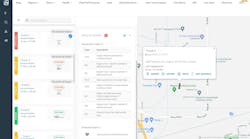The Federal Motor Carrier Safety Administration (FMCSA) has delayed the start date of the new Comprehensive Safety Analysis 2010 (CSA 2010) program until November, said William Quade, FMCSA associate administrator for program delivery and enforcement. The program was to have launched in June.
Speaking April 8 at the National Tank Truck Carriers annual Tank Truck Safety & Security Council Seminar in Nashville TN, Quade said the delay was needed to provide more preparation time for the government and the trucking industry. Enforcement interventions under CSA 2010 probably won’t start until Spring 2011 at the earliest.
“We made the decision to delay the start date because we were hearing a lot of industry concerns about the CSA 2010 program,” Quade said. “Those concerns need to be addressed, especially issues such as crash accountability. In some cases, there is no easy fix, but we are listening to the carriers, and we will do what we can.
“CSA 2010 is a good program, and we believe it will improve trucking safety. We’ve been running field tests on the program for the past two years, and the data says the new system works. The compliance reviews work under the new program just as they did under SafeStat.”
Six behavioral categories make up the new Safety Management System under CSA 2010, and these categories are among the factors that have raised trucking industry concerns. Four of the categories target drivers: Safe driving, driver qualifications, fatigue, and drugs and alcohol. The two fleet categories are vehicle maintenance and cargo securement (which includes hazmat factors).
Interventions are a key component of the CSA 2010 program. The process starts with warning letters, followed by targeted interventions for specific problems, then offsite interventions, and finally a comprehensive review.








